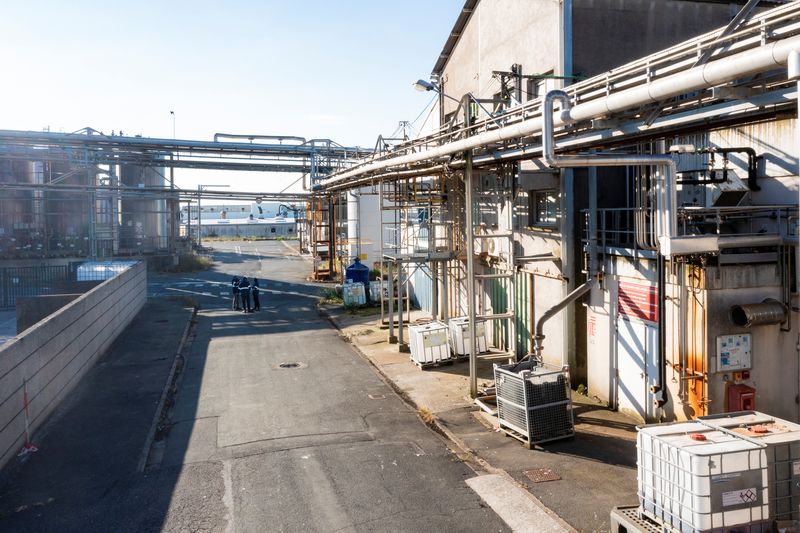Factbox-Companies forging a rare earths industry in the EU
2024.06.27 00:41
LONDON (Reuters) – In the rare earths sector, the EU will struggle to meet most of its ambitious goals in new legislation designed to boost domestic output of critical minerals and reduce dependence on China.
The EU’s Critical Raw Materials Act (CRMA) targets that by 2030 the bloc will mine 10% of its requirements for strategic minerals, process 40%, and meet 25% of demand from recycling.
Below are some key companies working on rare earths, with production figures in metric tons per year.
Norwegian companies are included because even though the country is not an EU member, it is part of the European Economic Area.
Neodymium and praseodymium (referred to in the industry by their joint elemental abbreviation, NdPr) are key rare earths needed to make permanent magnets.
MINING
Leading Edge Materials
It owns the Norra Karr project in Sweden, which analysts say could supply most of the EU’s needs for heavy rare earths with average annual output of 5,340 tons of mixed rare earth oxides.
There has been opposition due to concerns it could pollute drinking water, but the firm redesigned the mine and plans to submit a new application for a lease early next year.
LKAB
Sweden’s state-owned iron ore producer plans to extract rare earths from waste material from an existing mine. It plans to produce 2,000 tonnes a year of rare earth oxides, starting between 2028 and 2030. An independent consultant says about 200 tonnes would be NdPr oxides.
The group also plans to develop the Per Geijer deposit, which has up to 10 times more rare earths than existing mines, but it could take 10-15 years before mining started, the company said last year.
Finnish Minerals Group
This state-owned firm owns the Sokli project in Finland, which is rich in light rare earths and could supply about 10% of EU needs. It needs to go through environmental assessment and permitting and the firm targets production by 2035.
Quantum (NASDAQ:) Mineria
This private firm identified the Matamulas deposit in Spain, about 225 km south of Madrid, which could produce up to 1,500 tons of NdPr oxides. A regional government rejected an application for a mining permit in 2019 and the company is hoping the decision will be reversed.
It is also seeking an exploration permit for another possible project named Pl Neodymium southeast of Matamulas.
Rare Earths Norway
This private company said this month it has Europe’s biggest rare earth deposit, the Fen project in Norway, which aims to produce 2,000 tons of NdPr by 2031.
PROCESSING/MAGNETS
Solvay
The Belgian chemical group owns a 76-year-old plant in France that produces 4,000 tons of rare earth oxides for auto catalysts and electronics, but none of the NdPr needed for making permanent magnets.
Solvay (EBR:) expects to launch output of NdPr in 2025 and aims to produce enough processed rare earths for magnets to meet 20%-30% of European demand, but this may not be achieved until after 2030.
Carester
This private French company founded five years ago includes several employees who formerly worked on rare earths at Solvay.
The firm, which agreed in March to form a partnership with Solvay, plans to start production in 2026 at a plant that will produce over 1,000 tons of rare earth oxides mainly from recycled magnets, but initially will also process mining concentrates.
Neo Performance Materials
This Canadian-listed firm owns a processing plant in Estonia with capacity of 3,000 tons of rare earth oxides, about a quarter of which are NdPr.
The company is also building a permanent magnet plant in Estonia, which is due to launch next year and ramp up to 2,000 tons capacity over the following two to three years and later expand to 5,000 tons.
Vacuumschmelze (VAC)
One of the biggest magnet producers outside of China, this German company would like to expand in Europe and is in negotiations with potential customers including automakers to secure long-term commitments.
GKN (LON:) Powder Metallurgy
This private company is operating a pilot plant in Germany for permanent magnets and is planning to build a factory in Europe with production of 4,000 tons by 2030.
Mkango Resources
This rare earths group is planning to build a separation plant in Pulawy, Poland that will produce 2,000 tonnes of NdPr oxides and 50 tons of heavy rare earths before 2030.
The company is also developing the HyProMag magnet recycling plant in Germany, aiming to produce 500 tons of magnets by 2030.
Orano
French state-owned nuclear fuel specialist Orano is leading the Magnolia Project, which launched in 2022 and aims to develop a process for recycling and manufacturing permanent magnets for EV motors with 25% recycled content.
A pilot line is due to be commissioned by the end of 2024, but there is no timeline yet for commercial production.
Magneti Ljubljana
This private Slovenian company produces 30 tons of permanent magnets for EVs and wind turbines. It aims to expand production to over 2,000 tons. It plans to source raw material from U.S. company Phoenix Tailings, which uses new technology to produce rare earth metals from mine tailings.
MagREEsource
This French company, a spin-off from France’s CNRS scientific research institute, plans to open a plant soon to manufacture permanent magnets from recycled materials, the first stage of a larger factory that aims to go into production in 2027, ramping up to 1,000 tons of magnet output by 2030.
Heraeus Remloy
This private German company launched a plant last month to recycle electronic devices into rare earth magnetic alloy powders that can be used to make permanent magnets. The factory plans to ramp up to full capacity of 600 tons a year within three years. Capacity can be doubled if demand warrants it.

REEtec
This Norwegian company is building a commercial plant using new technology for rare earths separation that is due to launch production in 2025 with output of 720 tons of NdPr.








